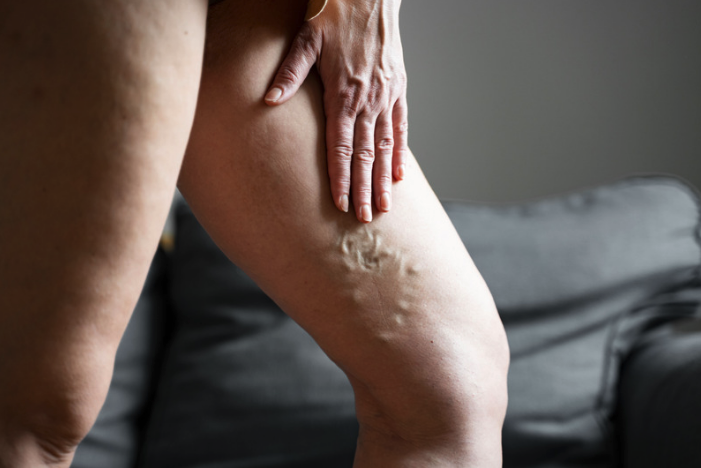Varicose Veins
Understanding Causes, Symptoms, Diagnosis, and Treatments
What are Varicose Veins?
Varicose veins are veins that have become enlarged and twisted, often appearing dark blue or purple. They usually occur in the legs, but can also occur in other parts of the body. Varicose veins are caused by the failure of the valves in the veins to work correctly, leading to blood pooling and swelling. Varicose veins are a common condition as around 20% of adults get it at some point in their lives. They are more common in women than men and are more likely to develop as people age. Although varicose veins are usually a cosmetic concern, they can cause discomfort, pain, and other complications in severe cases. Understanding the causes, symptoms, diagnosis, and treatments of varicose veins can help people manage the condition and prevent complications.
Causes of Varicose Veins
Varicose veins occur when the valves in the veins that help the blood flow back to the heart are weakened or damaged. This can cause the blood to pool in the veins, which leads to their enlargement and twisting. The following are some common causes of varicose veins:
Genetics: Varicose veins can be hereditary, meaning they can be passed down from generation to generation.
Age: As we age, the veins in our legs can lose their elasticity, making them more susceptible to becoming varicose.
Gender: Women are more likely than men to develop varicose veins due to hormonal changes during pregnancy, menopause, and the use of birth control pills.
Obesity: Being overweight can put extra pressure on the veins in the legs, causing them to become varicose.
Lifestyle: Standing or sitting for long periods, especially with crossed legs, can also contribute to the development of varicose veins.
Symptoms of Varicose Veins
Depending how severe the condition is, varicose veins can cause a variety of symptoms, which includes:
Aching or throbbing pain in the legs
Swollen or heavy-feeling legs
Itching around the veins
Muscle cramps or restless legs
Skin discoloration or ulcers near the affected veins
Diagnosing Varicose Veins
Your doctor can diagnose varicose veins by conducting a physical exam, blood test, and a review of the patient's medical history. Other tests that your doctor may perform to confirm a diagnosis:
Ultrasound: An ultrasound can be used to look at the blood flow in the legs and identify any blockages or blood clots.
Venography: A type of X-ray that can be used to look at the blood flow in the veins.
Treatment Options for Varicose Veins
The treatment options for varicose veins will depend on the severity of the condition. Some common traditional treatment options include:
Compression stockings or bandages: These help to improve blood flow in the legs and reduce swelling.
Lifestyle changes: Regular exercise, maintaining a healthy weight, and avoiding prolonged sitting or standing can help to improve blood flow in the legs.
Medications: Medications such as diuretics, anticoagulants, and anti-inflammatory drugs may be prescribed to manage the symptoms of varicose veins.
However, if those treatment options do not improve the symptoms of the condition, your doctor may recommend minimally invasive procedures such as:
Endovenous thermal ablation: This is a minimally invasive procedure that uses either laser or radiofrequency waves to seal off damaged veins.
Sclerotherapy: This involves injecting a solution into the affected vein, which causes it to collapse and be eventually fade away.
Laser treatment: This involves using a laser to heat and destroy the affected veins.
Microphlebectomy: It is a minimally invasive procedure that involves tiny incision made in the skin to remove large varicose veins. It is sometimes performed in conjunction to sclerotherapy.
Treating Varicose Veins at Indiana Vascular
Varicose veins are a common condition that can cause discomfort, pain, and other complications in severe cases. Understanding the causes, symptoms, diagnosis, and treatments of varicose veins can help people manage the condition and prevent complications.
At Indiana Vascular, we offer a facility filled with state-of-the-art equipment and a staff of experienced doctors that specialize in treating varicose veins, as well as other conditions. We will work with you in creating a treatment plan tailored to your individualized needs, and will walk with you every step of the way to ensure a favorable outcome and swift recovery.
Do not allow varicose veins to negatively impact your quality of life. Schedule an appointment with us today to receive a consultation and gain insight into the condition, as well as discover how we can enhance your overall health.
Frequently Asked Questions
-
Varicose veins are generally not life threatening, but in some cases they can lead to health complications such as skin ulcers and blood clots.
-
While varicose veins cannot be completely prevented, maintaining a healthy weight, exercising regularly, and avoiding prolonged periods of sitting or standing can help reduce the chances of gettin them.
-
There is always a small chance that varicose veins can recur after treatment, but this is less likely with newer, minimally invasive treatments.
-
While there are no natural remedies that can cure varicose veins, there are some at home treatments that may help reduce symptoms, such as elevating your legs, wearing compression stockings, and exercising regularly.
Are You Suffering From Varicose Veins?
Click below to learn more about the minimally invasive procedures we offer to treat it.

